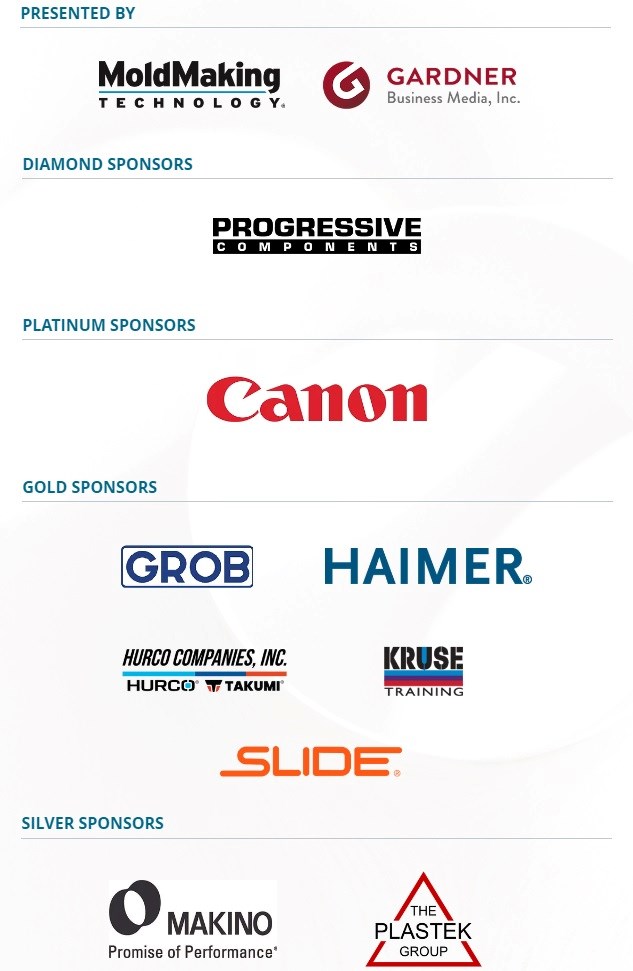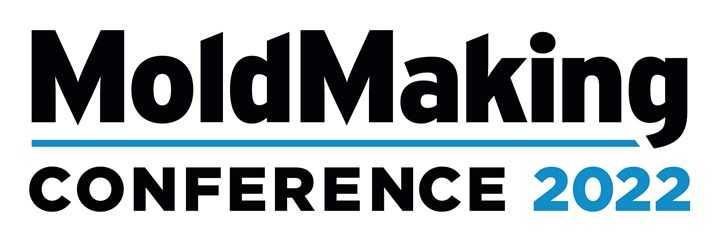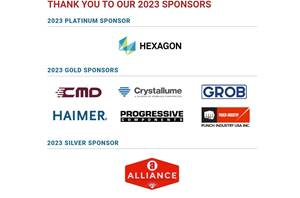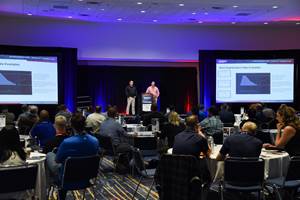Mold Building
Goal: To examine challenges and strategies to further evolve from being a mold shop, to a mold manufacturer. We will look at technology deployment of the variety of processes used to build a mold, such as 3D printing, machining steel or aluminum, applying the right cutting tools and toolholders, selection, EDM, automation, incorporating proper mold materials, mold components and hot runner systems.
Who Should Attend: Company Owners, Operations/Plant Managers and Shop Foremen.
Sessions
Applying Predictable Manufacturing to your Mold-Building Operation, Dave Tomic, President, Eden Tool & Eden Manufacturing
Moldmaking is not just about performance; it's about predictable performance. Eden Tool is a 17-person medical mold builder known for its high-end hard milling, EDM, and grinding capabilities. Predictable manufacturing is their central focus. Eden's goal is building molds that exceed their defined lifecycle expectations while delivering consistent, high-quality parts.
Over the last 15 years, Eden tool has re-imagined how molds and mold components are designed and manufactured. They have implemented techniques to consistently produce the expected results with a high degree of accuracy.
At the very core of the process is hard milling. To Eden Tool, hard milling is much more than just milling hardened steel fast; it's the entire process. Hard milling provides the ability to automatically rough and finish to very tight tolerances and fine surface finishes, lights out!
This requires more than an accurate machine or good operator and programmer. Everyone needs to understand all the variables including heat, geometric design limitations, cutter wear and deflection, programming techniques and machine dynamics. Armed with that knowledge, Eden Tool has integrated probes and lasers with automated macros to help manage these variables.
Come learn how Eden Tool consistently builds predictable manufactured solutions from mold to product, cavity to cavity, and part to part!
New P20 Steel Eliminates Demand for Stress Relieving After Rough Cutting, GM Manufacturing Engineer, Shane Appel; Greg DeFranciso, Omega Tool Director of Sales, Program Management and Estimating and Louis Phillipe Lapierre-Boire, Vice President and General Manager of Finkl Steel – Sorel
Omega Tool Corp. was invited by GM to participate in a study comparing conventional P20 against a relatively new P20 variant developed by Chicago-based Finkl Steel known as MD Xtra. Introduced a few years before, the material was gaining popularity among European moldmakers but hadn’t caught on in North America yet. The new grade offered a host of interesting properties. However, what most intrigued both the OEM and mold builder was the possibility of skipping the stress-relieving step after rough cutting, which could shorten mold production by up to a week. With that in mind, Finkl, Omega, GM and the molder set out to see if, indeed, that was the case. They recognized that while there was interest in the new material, most companies would be reluctant to spec it without more test data so they could understand its behavior versus conventional P20. Comparing conventional P20 and MD Xtra side-by-side in production fascia tools confirmed the new material’s dimensional stability and revealed no downside. Finkl Steel’s MD Xtra P20 variant machines, grains/polishes the same as or better than conventional P20 but with much lower internal stresses, better through-hardness consistency and greater thermal conductivity.
Applying Industry 4.0 Takes Imagination and Collaboration, Geoff Luther, A1 Tool
According to A1 Tool Owner Geoff Luther, the Fourth Industrial Revolution—including automation, data exchange and 3D printing—has given rise to the concept of Industry 4.0, which he believes is now giving way to the Imagination Age.
To A1 Tool that means building molds with intelligence. But it’s more than that. It takes robust systems and processes to efficiently produce a plastic injection mold today, so understanding your customers’ needs, the tooling requirements and how best to integrate, monitor and automate the proper Industry 4.0 technology and/or principle is critical. It takes imagination and collaboration!
For example, A1 Tool has integrated and monitored technologies such as RJG sensors, Mold Flow simulation software and CVE monitors to improve mold efficiency and determine better preventative maintenance. CVE electronic mold devices monitor and store all the information about a mold's life — cycles completed, cycle time over the tool’s life, cycle time over the last 25,000 cycles, percentage of activity versus downtime, downtime date ranges and increments where mold maintenance was performed. Mold flow technology highlights potential issues, expected cycle times, etc. – all in the design phase. Water temperature and pressure modules provide critical data regarding the mold’s efficiency and preventative maintenance. RJG sensors and processes provide the most informative fill levels, pressures, speeds and mold repeatability, regardless of what press a mold is run in.
Obviously not all molds need this level of intelligence, so understanding when and where to integrate technology is vital and will set you apart from your competition. Come to this session to learn how the A1 Tool team stretches its imagination, collaborates with industry partners and pushes the envelope on innovative designs by continually enhancement its molds using real-time data based on Industry 4.0 technology. Imagine what your shop can do.
Profitability Prediction and Monitoring with 3D-Printed Tooling, Industrial IOT & AI, Amanda Wiriya, Director of Manufacturing Support, Wepco Plastics, Zachary Smith, founder and CEO of Instaversal and Partner, Mata Inventive
Although conformal cooling is not a new concept, advancements continue to make it a very hot topic. Learn about a new conformal cooling process and algorithm and what it reveals about hot spots and conformal cooling design. This session will cover how to apply predictive engineering modeling to conformal cooling design using a demo part, going through the improvement production validations and reviewing industry 4.0 technology that keeps performance goals on target each step of the way. If you're working with injection-molded parts where cycle time is really important or you're dealing with critical dimensions and tolerances, check out this session on the CoolTool 4.0 technology that can manage both pre and post-production profitability. With predictive engineering modeling, times, temperatures, dimensions and costs are optimized alongside supercharged 3D-metal printed CoolTool mold inserts.
Leveraging technology that was used for the semiconductor manufacturing equipment industry into conformal cooling with additive manufacturing, this team uses a generative design process to identify how to lower cooling time. The times determined before going into production can now be monitored alongside temperature, pressure and proximity sensors, adding more transparency of the performance improvement. Return on investment (ROI) and savings are visible through a Factory Management Platform.
Collaboration for Disruptive Tooling, Jason Murphy, Next Chapter Manufacturing, Steve Michon, Zero Tolerance
As molds continue to be more complex and resins more demanding for cooling and venting, attendees will discover how proper deployment of additive within the overall moldmaking will eliminate common molding defects while streamlining mold installation, ensuring quicker mold approval and better profitability for mold builders and molders.
Come learn how a complex part design required a mold solution that reliably molded the part shot after shot to meet the exacting part print tolerances while reducing the cycle time. Presenters will team up to present the technical details of this exciting case study to show how additive tooling complimented one mold builder’s existing capabilities to grow the business. They will discuss a successful mold build for complex mold cooling and venting, adaptation of additive tooling from a mold builder’s perspective, elimination of cost and lead time in the mold building workflow and efficient workholding solutions to eliminate setup and machining time.
Visit moldmakingconference.com to register today!
If you register before the Early Bird Deadline of October 7th, you will save $200 on the registration cost. Register today and SAVE BIG!

Related Content
Moldmaking is a Relentless Pursuit of Innovation
Innovation is at the root of mold manufacturing, which includes technology and strategies for mold design, automation, collaboration, communication, talent development, reshoring and sustainability.
Read MoreMoldMaking Conference Right Around the Corner!
This year features a dynamic lineup of experts focused on technical innovations, business strategies and workplace development initiatives for mold manufacturers. See the full agenda and register today!
Read MoreMoldMaking Conference Session Spotlight: HOT TOPICS
Want to learn how to successfully reshore tooling or how to play a part in sustainability or how to take advantage of the changes to the R&D Tax Credit?
Read MoreMoldMaking Conference Session Spotlight: Data
Want to learn about digital workflows in mold design or ERP or global mold monitoring and asset management or the impact of tooling digitalization?
Read MoreRead Next
Reasons to Use Fiber Lasers for Mold Cleaning
Fiber lasers offer a simplicity, speed, control and portability, minimizing mold cleaning risks.
Read MoreHow to Use Strategic Planning Tools, Data to Manage the Human Side of Business
Q&A with Marion Wells, MMT EAB member and founder of Human Asset Management.
Read MoreHow to Use Continuing Education to Remain Competitive in Moldmaking
Continued training helps moldmakers make tooling decisions and properly use the latest cutting tool to efficiently machine high-quality molds.
Read More






















